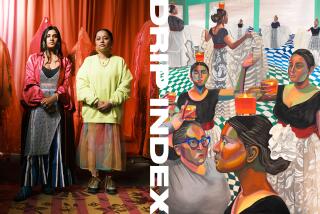Black History Month Spurs Sales at Specialty Businesses in Inglewood
It is not only in its annual Martin Luther King Jr. Day parade or its many black churches that Inglewood evidences its sizable African-American population, but also in an array of shops that market the tastes and trends of black America.
Selling everything from West African snakeskin purses and Bob Marley stickers to sweat shirts from black colleges and black versions of the Last Supper, these stores and boutiques scattered throughout the city mark part of its racial identity.
This month, they are particularly busy.
Black History Month has sent many customers to these small shops for history books, paintings of black trailblazers and anything else on the black experience in America.
Some of the wares--such as brightly colored clothing and carved walking sticks--are imported from Africa. Americanized merchandise includes a black Bart Simpson T-shirt and framed quotations of the Rev. Martin Luther King Jr.’s “I Have a Dream” speech.
At the Collegian Connection on La Brea Avenue, you won’t find Harvard, Yale or Stanford apparel.
The shop, in its first year of operation, deals exclusively in paraphernalia from predominantly black colleges, such as Howard University in Washington, D.C., Tuskegee University in Alabama, and Grambling State University in Louisiana. “The Blacker the College, the Sweeter the Knowledge,” one shirt declares.
Browsing at Collegian Connection is different from other stores, too. The two owners, academic counselors at El Camino College, plug the benefits of black colleges to young customers, providing advice, applications and brochures.
In the back, behind the T-shirts, key chains, caps and license plate frames, is a conference room that black college alumni groups and recruiters often use. This month, owners Elaine Moore and Cheryl Beverly-Grant have been busy spreading their message at area schools’ Black History Month observances.
“You’re in an environment where you are expected to succeed,” Moore, a Howard graduate, said of black colleges. “Other students are not thinking you are there because of affirmative action. Professors are not doubting whether you can succeed. You are a majority.”
The store attracts a mix of customers: trendy teen-agers who like the jazzy clothing no matter what the school, college-bound students outfitting themselves for higher education and alumni reminiscing about the good old days.
“Some kids come in and say, ‘I want something to match these brown pants,’ ” Moore said. Others, usually older, will walk into the store and exclaim, “I haven’t seen a Tuskegee sweat shirt since 1956.”
Just down La Brea Avenue from the Collegian Connection is Dyrus Cooper’s art gallery, featuring prints and original works by black artists. Among the faces along the walls are Malcolm X, Spike Lee and Mike Tyson.
“Blacks are opening their eyes more to black history. I’m the supplier,” said Cooper, 71, a former welder at the Long Beach Naval Shipyard who sold dashikis during the mid-’60s, then switched to art in the 1970s.
Business has taken off since Cooper opened his first gallery in Los Angeles. Store No. 2 opened in Inglewood in 1985, and Cooper now supplies more than 1,900 art galleries across the country. He has sold black art to set designers at such popular television shows as “The Cosby Show” and “Frank’s Place.”
The black experience is shown in many forms and spanning many generations on Cooper’s walls. There are scenes of segregation in the South next to portraits of Mike Tyson and Sammy Davis Jr. There are papyruses showing Egyptian goddesses and Martin Luther King Jr. delivering a sermon before a choir made up of famous black women in history.
“I try to do things people can relate to,” said Ray Bachelor, 67, of Inglewood, who painted the black Last Supper painting that hangs in Cooper’s gallery. “You have a lot of blacks that don’t want no white in their house.”
Cooper says his affordable reproductions, which sell for as little as $10 for black-and-white prints, are aimed at those who want black art but do not have thousands of dollars for originals. He said he began his business purely to make a living, but he realizes now that the artwork inspires pride in many of his customers.
“I’m showing that blacks have made major contributions,” he said, pointing out paintings of black astronauts, entertainers and soldiers.
Africana, a small shop in the basement of the Inglewood Department Store on Manchester Boulevard, offers unusual African merchandise, such as snakeskin purses and wallets from Senegal, as well as a matching bow tie and cummerbund in African colors.
“A lot of customers come here to support a black business,” said Africana manager Pap Diop. “They say, ‘Keep it up.’ ”
Mini-malls dot the Southern California landscape but unlike many of them, the International Afrikan Mini Mall has no nail salon, no liquor store, no doughnut shop.
Filling this former insurance office building on East Spruce Avenue are several separate businesses dealing in African clothing and wood carvings, black greeting cards and T-shirts sporting slogans like, “Before there was any history, there was black history.”
John Farris, who works at one of the stores in the mini-mall with his wife, Odell, and son, John, said one of his missions is to educate young people who come in to browse. He said he identifies the historical figures on the walls and tells young people that the African carvings are part of a tradition going back thousands of years.
The two busiest months at the mini-mall, Farris said, are December, when people are shopping for holiday gifts, and February, when Black History Month inspires many to learn about the black experience.
“We try to fill a void,” Farris said. “We want black people to become aware of their heritage. Many people, even black people, think of monkeys and savages and Tarzan movies when they think of Africa, but there is a rich history to Africa.”
More to Read
Inside the business of entertainment
The Wide Shot brings you news, analysis and insights on everything from streaming wars to production — and what it all means for the future.
You may occasionally receive promotional content from the Los Angeles Times.










